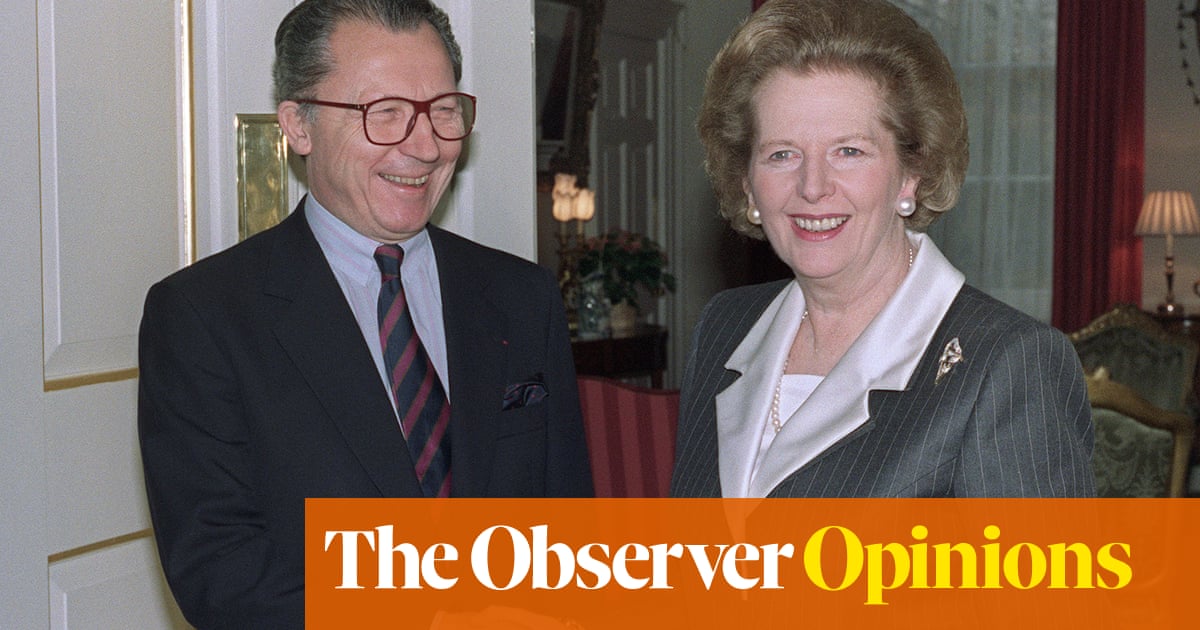
Both chancellor Jeremy Hunt and shadow chancellor Rachel Reeves went to the annual Davos World Economic Forum last week proclaiming that Britain was “open to business”.
These mundane statements of the obvious reminded me of the character in one of Michael Frayn’s novels who had an open mind – “open at the front and open at the back”.
For that is what Brexit has achieved. We spent almost 45 years opening our markets to what is now known as the European Union, adding the considerable benefit of membership of the single market – not least thanks to Margaret Thatcher and Jacques Delors. From the abandonment of monetarism onwards, the emphasis of British economic policy was on attracting overseas investment.
But in one fell swoop – thanks to a wholly unnecessary referendum, founded, alas, on ignorance, prejudice and lies – the Cameron government opened the back door. The single market was designed, from the UK’s point of view, to boost trade with and investment from the EU, but the exit was opened and Britain has suffered.
We are now experiencing the consequence of the bad influence that Thatcherite political economy had on our polity, and the rejection of the good. That is to say: so many of the ills that now so manifestly beset the nation result from the Thatcherite obsession with “rolling back the frontiers of the state”, while the economic performance of that same state is now impeded by the rejection of her greatest beneficial contribution to the country – namely membership of the single market.
Rolling back the frontiers of the state has affected the performance of so many of the public utilities whose reliable services we took for granted: everything from the NHS to education to the Post Office and the water and sewage system – let alone the rail network, which even Thatcher did not dare to privatise.
While not exactly a “failed state” in the sense of many countries one could name, the UK is certainly an ailing one, in which too many people are understandably inclined to say “nothing works properly”.
As one eminent historian said to me recently, “the people who gave us Brexit argued that it would reverse our economic decline. Instead it has accelerated that decline”.
Every day now, the evidence of the damage and interference to our daily lives wreaked by Brexit takes its toll: the extra bureaucratic burden of further customs checks is due in April, and border checks are being imposed later this year on the freedom of movement in the rest of Europe that we had previously taken for granted.
Meanwhile, we learn from the British Chambers of Commerce that 60% of firms are finding it more difficult to trade with the EU than was the case a year earlier, and the mayor of London has pointed out that Brexit is taking its toll on the metropolis, notwithstanding the fact that London is generally considered one of the most attractive tourist locations.
Sadiq Khan is not afraid to defy the omertà that has been imposed by the Labour leadership on the subject of the single market. Yet at a time when surveys indicate that no more than a fifth of leavers regard Brexit as a success, and most people recognise it as a disaster, Labour refuses to acknowledge in public that the “red wall” Brexit emperor has no clothes.
As I have written before, I am not confident that a Labour leadership that is frightened of saying boo to a goose will win the next election. But it seems blazingly obvious that the fissiparous Conservative party is doing its best to lose it – probably with a little help from the ghastly Nigel Farage and the so called Reform party.
Labour is indulging in all manner of preparations for government – while certainly not being overconfident. All this talk of the need for investment-led growth, and the importance of private-sector investment as well as public, is worthy and sensible, but it lacks the confidence-building assurance of a public – indeed, electoral – commitment to rejoin the single market.
Some of my contacts in the foreign exchange market tell me they believe such a commitment would have a beneficent impact on the pound – and hence on inflation – as well as on the prospect of attracting that inward investment that would make a reality of being “open to business”.
Having made his pro-business pitch in Davos, the chancellor announced his intention to concentrate on tax cuts in his next budget (or two). This is rationalised by the claim that low-tax economies favour stronger growth; the real reason is a desperate attempt to bribe the electorate. The unstated corollary is that, with more public sector austerity already in the pipeline, our public services will continue to suffer.












